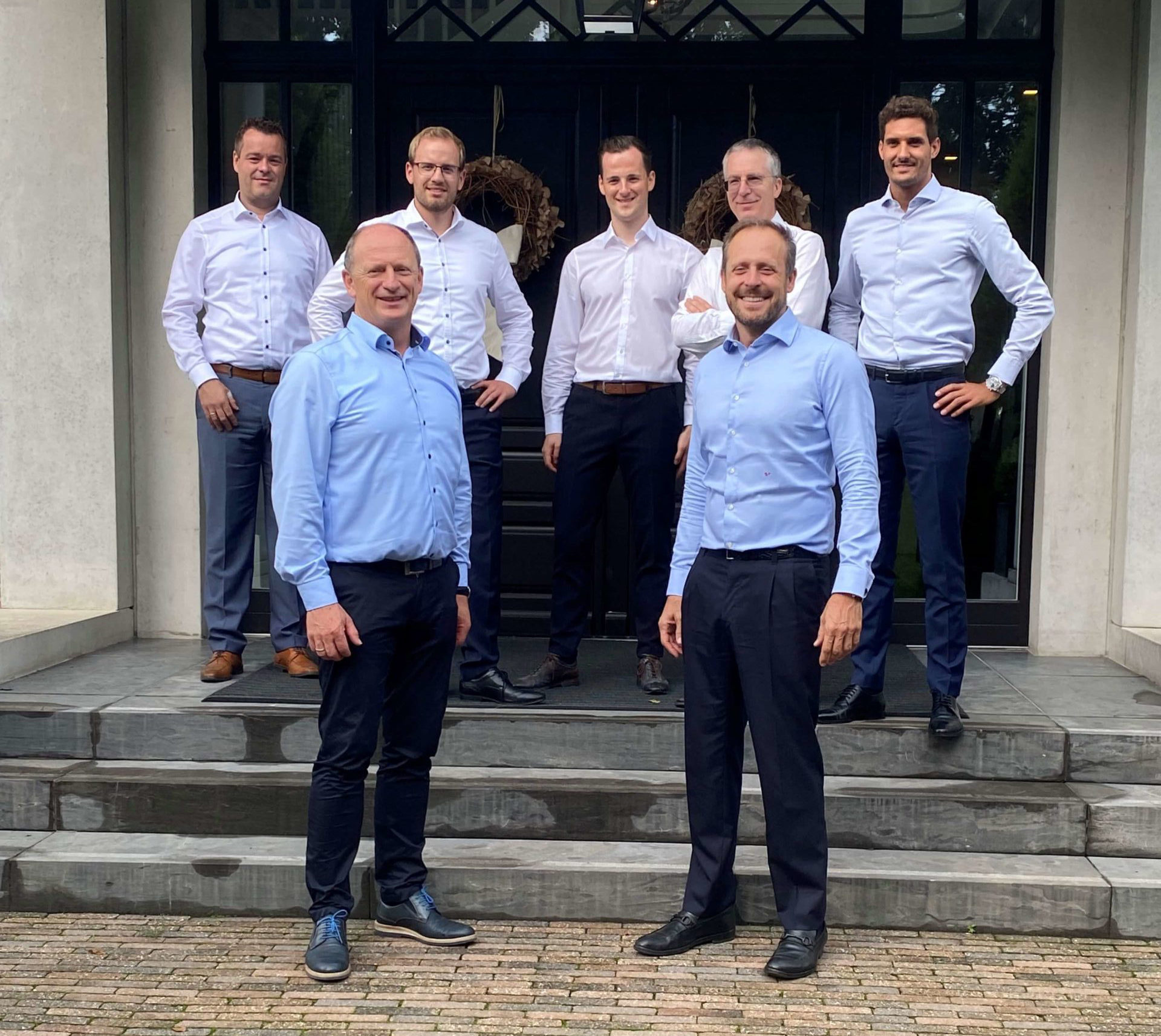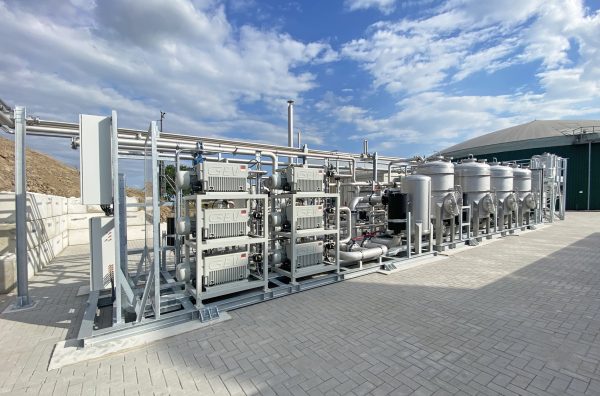Cooperation on the future of biogas plants
Cooperation agreement with the Italian plant manufacturer “Ecospray
On 15.07.2021 the RUHE group of companies signed the contract with the Italian plant manufacturer “Ecospray” for the future of biogas plants. Mr. Tzimurtas of the Oldenburgische Volkszeitung accompanied the last steps of the day and reported in detail.
Source: OM Medien Oldenburgische Volkszeitung, text and photo by Giorgio Tzimurtas

Pleased about the partnership: (from left, front) Kunibert Ruhe (Managing Director Ruhe Agrar) and Stefano Di Santo, head of Ecospray, after signing the contract in Lüsche with the other company representatives (from left, back) Thomas Rolfes (Managing Director Ruhe Agrar), Justus Ruhe (Ruhe Biogas Service), Max Ruhe (Managing Director Ruhe Biogas Service), Giorgio Copelli (Ecospray) and Alberto Fanchini (Ecospray).
At 5:33 p.m., the final details were settled in the meeting room. “Deal,” was the word from the seven-person panel. The handshakes and signatures on the contracts followed. The “Ruhe Unternehmensgruppe” started a cooperation on Wednesday in Lüsche with the Italian plant manufacturer “Ecospray” a cooperation, which is considered a pioneer project on the biogas market. The project involves retrofitting agricultural biogas plants with a special module to produce a bio-additive for the truck fuel LNG (liquefied natural gas). The biogas is refined and liquefied in the process. The bio-LNG produced in this way is added to LNG produced from conventional natural gas, which has significantly lower emissions than diesel. The added bio-LNG can bring about a further reduction in CO2 emissions of up to 80 percent, according to technical articles. That’s why Kunibert Ruhe, the company’s CEO, emphasizes two special features. “We have found a solution so that a typical agricultural biogas plant can continue to be operated economically after the subsidy under the Renewable Energy Sources Act expires. We offer the farmer a solution for the future”. In addition, he said, the aim is to help achieve the far-reaching climate policy goals of the German government and the EU – to reduce greenhouse gas emissions by 55 percent by 2030. “This is a very important step for us,” says Ruhe, highlighting the importance of the partnership with Ecospray. And the chief executive officer (CEO) of the Italian plant manufacturer, Stefano Di Santo, also describes the launch of the project as “a very important moment” for his company, which is based in the municipality of Alzano Scrivia, about 50 kilometers south of Milan. The German market is the most important in Europe for the product. With Ruhe Agrar in Lüsche, Ecospray has the strongest partner here, says Di Santo.
Two contracts were signed with the plant manufacturer Ecospray, as Max Ruhe explains. He is the managing director of “Ruhe Biogas Service GmbH” (a subsidiary of the Ruhe group of companies), which is the exclusive distributor in Germany of Ecospray’s technology for the production of bio-LNG from biogas – in cooperation with the Italian company. Ruhe Biogas Service GmbH offers farmers who want to convert to BioLNG production an “all-round package,” says Max Ruhe. In other words, the service from connecting the standard module in container form to the biogas plant to supplying filling stations with the bio-LNG. In addition, Ruhe Agrar has concluded the purchase agreement with Ecospray for Germany’s first plant for the production of bio-LNG. The pilot project is being implemented in Darchau (Lüneburg district) at an existing Ruhe Agrar biogas plant, whose output is also being increased. Production of bio-LNG is expected to start there in the summer of 2022. The state of Lower Saxony is funding the project with 55 percent. Company boss Kunibert Ruhe puts the total cost at around 3.5 million euros. If there is standardization, he said, building more plants for customers will be below that amount. The plant in Darchau will also serve as a showcase for potential customers. In an interview with the editorial team, Ecospray CEO Di Santo points to the important role of the concrete and tangible example for the target group – the farmers. A company filling station is also planned in Darchau. To this end, Ruhe Agrar’s agricultural trucks are to be gradually converted to run on LNG. Having your own filling station on the farm and saving CO2 – this can also be an option for farmers who decide to produce bio-LNG. Thomas Rolfes, managing director of Ruhe Agrar, draws attention to this. Ecospray started up its first bio-LNG production plant in Novi Ligure, Italy, at the end of December 2020. There, landfill gas is used to produce one ton of LNG per day. Kunibert Ruhe was on site with a team, and planners and experts from Dekra were also present. This type of plant from Ecospray is set to become the standard for the production of bio-LNG in Germany. Di Santo says the company is now entering a very demanding market with this technology. It was the “beginning of a journey,” he said. He is convinced that the representatives of the calm agrarian community will be a success, as they are also good people. In the case of the partnership, this basic situation is important: The subsidy for biogas plants under the Renewable Energy Sources Act (EEG) expires after 20 years. Farmers are therefore concerned about how they can continue to operate their biogas plants economically. Kunibert Ruhe says: In view of the discussion about CO2 reduction, his company came up with the idea of using biogas for the production of bio-LNG. The search for a plant technology for this took about two years. One of the difficulties: It involved the production of comparatively small quantities. In Darchau, the figure is said to be 2.3 tons per day. By comparison, large plants producing LNG from conventional natural gas produce 1000 tons per hour. So now, with Ecospray’s technology, the right solution has been found for converting agricultural biogas plants to produce bio-LNG. This is an economical form of continued operation after the expiry of the EEG subsidy, because it helps to save CO2 significantly – and thus also money for the operators of truck fleets. This is because they have to comply with quotas for reducing greenhouse gas emissions. The better it succeeds, the cheaper it is. Quota prices range from 200 to 400 euros per metric ton of CO₂. Environmentally friendly biofuels are therefore in high demand in the transportation industry because they lower the quota and thus the costs. This is the key point why biogas plants can be lucrative with the production of bio-LNG even after the EEG subsidy, says Ruhe. And because the savings in emissions quotas depends on the feedstocks used to create the biomethane and then the bio-LNG, it’s most economical for farmers “to run 100 percent manure into the biogas plant,” Ruhe explains. As a rule, the less renewable raw materials (such as corn) are used, the higher the purchase price for the bio-LNG.
About RUHE Biogas
The RUHE group of companies is a family business with a strong agricultural background. From its headquarters in Lüsche, Lower Saxony, it manages farms in Lower Saxony, Mecklenburg-Western Pomerania and Brandenburg and operates biogas plants, four of them with an electrical output of 2.74 megawatts.
With 20+ years of operational experience, modern working methods and a motivated team, RUHE Biogas is your partner for the maintenance, optimization and future of biogas plants with liquefaction concepts.

